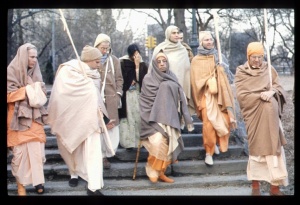CC Madhya 24.52: Difference between revisions
m (1 revision(s)) |
(Vanibot #0054 edit - transform synonyms into clickable links, which search similar occurrences) |
||
| (One intermediate revision by one other user not shown) | |||
| Line 1: | Line 1: | ||
{{ | [[Category:Sri Caitanya-caritamrta - Madhya-lila Chapter 24|C052]] | ||
<div style="float:left">'''[[Sri Caitanya-caritamrta|Śrī Caitanya-caritāmṛta]] - [[CC Madhya|Madhya-līlā]] - [[CC Madhya 24|Chapter 24: The Sixty-One Explanations of the Atmārāma Verse]]'''</div> | |||
<div style="float:right">[[File:Go-previous.png|link=CC Madhya 24.51|Madhya-līlā 24.51]] '''[[CC Madhya 24.51|Madhya-līlā 24.51]] - [[CC Madhya 24.53|Madhya-līlā 24.53]]''' [[File:Go-next.png|link=CC Madhya 24.53|Madhya-līlā 24.53]]</div> | |||
{{CompareVersions|CC|Madhya 24.52|CC 1975|CC 1996}} | |||
{{RandomImage}} | |||
==== TEXT 52 ==== | ==== TEXT 52 ==== | ||
<div | <div class="verse"> | ||
śrutvā guṇān bhuvana-sundara śṛṇvatāṁ te | :śrutvā guṇān bhuvana-sundara śṛṇvatāṁ te | ||
nirviśya karṇa-vivarair harato | :nirviśya karṇa-vivarair harato 'ṅga-tāpam | ||
rūpaṁ dṛśāṁ dṛśimatām akhilārtha-lābhaṁ | :rūpaṁ dṛśāṁ dṛśimatām akhilārtha-lābhaṁ | ||
tvayy acyutāviśati cittam apatrapaṁ me | :tvayy acyutāviśati cittam apatrapaṁ me | ||
</div> | </div> | ||
| Line 14: | Line 18: | ||
==== SYNONYMS ==== | ==== SYNONYMS ==== | ||
<div | <div class="synonyms"> | ||
''[//vanipedia.org/wiki/Special:VaniSearch?s=śrutvā&tab=syno_o&ds=1 śrutvā]'' — hearing; ''[//vanipedia.org/wiki/Special:VaniSearch?s=guṇān&tab=syno_o&ds=1 guṇān]'' — the transcendental qualities; ''[//vanipedia.org/wiki/Special:VaniSearch?s=bhuvana&tab=syno_o&ds=1 bhuvana]-[//vanipedia.org/wiki/Special:VaniSearch?s=sundara&tab=syno_o&ds=1 sundara]'' — O most beautiful one in the whole creation; ''[//vanipedia.org/wiki/Special:VaniSearch?s=śṛṇvatām&tab=syno_o&ds=1 śṛṇvatām]'' — of those hearing; ''[//vanipedia.org/wiki/Special:VaniSearch?s=te&tab=syno_o&ds=1 te]'' — Your; ''[//vanipedia.org/wiki/Special:VaniSearch?s=nirviśya&tab=syno_o&ds=1 nirviśya]'' — entering; ''[//vanipedia.org/wiki/Special:VaniSearch?s=karṇa&tab=syno_o&ds=1 karṇa]-[//vanipedia.org/wiki/Special:VaniSearch?s=vivaraiḥ&tab=syno_o&ds=1 vivaraiḥ]'' — by the holes of the ears; ''[//vanipedia.org/wiki/Special:VaniSearch?s=harataḥ&tab=syno_o&ds=1 harataḥ] [//vanipedia.org/wiki/Special:VaniSearch?s=aṅga&tab=syno_o&ds=1 aṅga]-[//vanipedia.org/wiki/Special:VaniSearch?s=tāpam&tab=syno_o&ds=1 tāpam]'' — decreasing all the miserable conditions of the body; ''[//vanipedia.org/wiki/Special:VaniSearch?s=rūpam&tab=syno_o&ds=1 rūpam]'' — the beauty; ''[//vanipedia.org/wiki/Special:VaniSearch?s=dṛśām&tab=syno_o&ds=1 dṛśām]'' — of the eyes; ''[//vanipedia.org/wiki/Special:VaniSearch?s=dṛśi&tab=syno_o&ds=1 dṛśi]-[//vanipedia.org/wiki/Special:VaniSearch?s=matām&tab=syno_o&ds=1 matām]'' — of those who can see; ''[//vanipedia.org/wiki/Special:VaniSearch?s=akhila&tab=syno_o&ds=1 akhila]-[//vanipedia.org/wiki/Special:VaniSearch?s=artha&tab=syno_o&ds=1 artha]-[//vanipedia.org/wiki/Special:VaniSearch?s=lābham&tab=syno_o&ds=1 lābham]'' — the achievement of all kinds of gains; ''[//vanipedia.org/wiki/Special:VaniSearch?s=tvayi&tab=syno_o&ds=1 tvayi]'' — unto You; ''[//vanipedia.org/wiki/Special:VaniSearch?s=acyuta&tab=syno_o&ds=1 acyuta]'' — O infallible one; ''[//vanipedia.org/wiki/Special:VaniSearch?s=āviśati&tab=syno_o&ds=1 āviśati]'' — enters; ''[//vanipedia.org/wiki/Special:VaniSearch?s=cittam&tab=syno_o&ds=1 cittam]'' — the consciousness; ''[//vanipedia.org/wiki/Special:VaniSearch?s=apatrapam&tab=syno_o&ds=1 apatrapam]'' — without shame; ''[//vanipedia.org/wiki/Special:VaniSearch?s=me&tab=syno_o&ds=1 me]'' — my. | |||
</div> | </div> | ||
| Line 21: | Line 25: | ||
==== TRANSLATION ==== | ==== TRANSLATION ==== | ||
<div | <div class="translation"> | ||
"'O most beautiful Kṛṣṇa, I have heard about Your transcendental qualities from others, and therefore all my bodily miseries are relieved. If someone sees Your transcendental beauty, his eyes have attained everything profitable in life. O infallible one, I have become shameless after hearing of Your qualities, and I have become attracted to You.' | |||
</div> | </div> | ||
| Line 28: | Line 32: | ||
==== PURPORT ==== | ==== PURPORT ==== | ||
<div | <div class="purport"> | ||
This verse (Śrīmad-Bhāgavatam 10.52.37) was written by Rukmiṇīdevī in a letter to Kṛṣṇa inviting Him to kidnap her. Śukadeva Gosvāmī described this to Mahārāja Parīkṣit when the King asked him how Rukmiṇī had been kidnapped. Rukmiṇī had heard about Kṛṣṇa’s qualities from different people, and after she heard about them, she decided to accept Kṛṣṇa as her husband. Everything had been arranged for her marriage to Śiśupāla; therefore she wrote a letter to Kṛṣṇa, which she sent through a brāhmaṇa, and invited Him to kidnap her. | This verse ([[Srimad-Bhagavatam|''Śrīmad-Bhāgavatam'']] 10.52.37) was written by Rukmiṇīdevī in a letter to Kṛṣṇa inviting Him to kidnap her. Śukadeva Gosvāmī described this to Mahārāja Parīkṣit when the King asked him how Rukmiṇī had been kidnapped. Rukmiṇī had heard about Kṛṣṇa’s qualities from different people, and after she heard about them, she decided to accept Kṛṣṇa as her husband. Everything had been arranged for her marriage to Śiśupāla; therefore she wrote a letter to Kṛṣṇa, which she sent through a ''brāhmaṇa'', and invited Him to kidnap her. | ||
</div> | </div> | ||
__NOTOC__ | |||
<div style="float:right; clear:both;">[[File:Go-previous.png|link=CC Madhya 24.51|Madhya-līlā 24.51]] '''[[CC Madhya 24.51|Madhya-līlā 24.51]] - [[CC Madhya 24.53|Madhya-līlā 24.53]]''' [[File:Go-next.png|link=CC Madhya 24.53|Madhya-līlā 24.53]]</div> | |||
__NOTOC__ | |||
__NOEDITSECTION__ | |||
Latest revision as of 23:10, 19 February 2024

A.C. Bhaktivedanta Swami Prabhupada
TEXT 52
- śrutvā guṇān bhuvana-sundara śṛṇvatāṁ te
- nirviśya karṇa-vivarair harato 'ṅga-tāpam
- rūpaṁ dṛśāṁ dṛśimatām akhilārtha-lābhaṁ
- tvayy acyutāviśati cittam apatrapaṁ me
SYNONYMS
śrutvā — hearing; guṇān — the transcendental qualities; bhuvana-sundara — O most beautiful one in the whole creation; śṛṇvatām — of those hearing; te — Your; nirviśya — entering; karṇa-vivaraiḥ — by the holes of the ears; harataḥ aṅga-tāpam — decreasing all the miserable conditions of the body; rūpam — the beauty; dṛśām — of the eyes; dṛśi-matām — of those who can see; akhila-artha-lābham — the achievement of all kinds of gains; tvayi — unto You; acyuta — O infallible one; āviśati — enters; cittam — the consciousness; apatrapam — without shame; me — my.
TRANSLATION
"'O most beautiful Kṛṣṇa, I have heard about Your transcendental qualities from others, and therefore all my bodily miseries are relieved. If someone sees Your transcendental beauty, his eyes have attained everything profitable in life. O infallible one, I have become shameless after hearing of Your qualities, and I have become attracted to You.'
PURPORT
This verse (Śrīmad-Bhāgavatam 10.52.37) was written by Rukmiṇīdevī in a letter to Kṛṣṇa inviting Him to kidnap her. Śukadeva Gosvāmī described this to Mahārāja Parīkṣit when the King asked him how Rukmiṇī had been kidnapped. Rukmiṇī had heard about Kṛṣṇa’s qualities from different people, and after she heard about them, she decided to accept Kṛṣṇa as her husband. Everything had been arranged for her marriage to Śiśupāla; therefore she wrote a letter to Kṛṣṇa, which she sent through a brāhmaṇa, and invited Him to kidnap her.